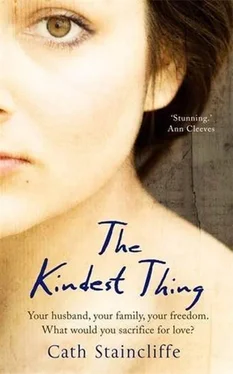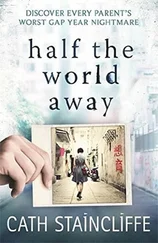The pills gave me a slightly giddy feeling, the world became gauzy and my capacity to cry at the slightest prompt diminished. Still my limbs felt leaden, my self soiled and raw and scared.
Believing it would help me to confront my sadness rather than try and escape it, I spent hours poring over the family photographs. I wasn’t considering them from a professional point of view – I had no interest in the focus of the shadows, the composition or contrast or depth of field – but hunting for understanding, for memory and meaning.
My father rarely appeared. Too often behind the camera. There was solace in the thought that I had inherited that skill from him. That I, too, had adopted that role. Among the portraits there were several black and white still-lifes and landscapes: a wrought-iron balcony in fierce light, the shadows inky against the smooth rendered wall, stormclouds above a winter field of stubble, a basket of fir cones and, my favourite, a yacht cutting through a glimmering ocean. He had written on the back, in neat print, White Sail – Whitby, ’61 .
Peering at the family groups I scouted for signs of love and affection. Felt relief when I found my mother’s smile, her hand on my shoulder. Near the bottom of the pile of loose snaps there was a small, square picture, which must have been taken on the box camera they had then. A man in dark dungarees holds a wallpaper brush, his head flung back in laughter. Beside him on a step-ladder stands a small child, her face creased in glee. My father and me. Did my mother take it? Or a friend calling by? What was so funny? I love the picture. I crave memories to match it.
Sophie was born four months after my mother’s death and I was still depressed. The contractions started before dawn and I sat by the lounge window, rocking when the pain came, and watched the pale February sun climb the sky before rousing Neil. We called the midwife and Neil took Adam to his mother’s – luckily she had the day off – and returned to find me pacing the bedroom, restless and out of sorts. The labour was so different from Adam’s, quicker and more violent. After only four hours in the first stage, I was ready to push, the overpowering urge forcing me to the floor, clinging to one corner of the bedstead, the midwife hastily rearranging the plastic sheets, and the doctor arriving as the head crowned.
The midwife spoke tersely, telling us the cord was tight around Sophie’s neck. The atmosphere in the room changed, a vortex of panic sucking the air. There was a whirl of activity as they readied instruments, told me not to push and prepared to cut the cord. I had read enough books to know that the cord was the baby’s lifeline and that if she didn’t get out quickly now she could be in trouble.
As soon as the cut was made I was instructed to push. I strained and groaned, the pain tearing through my vagina and bowels. With the second push she slithered out. She was paper white, her lips and eyelids blue like a fish. In the heartbeats it took to revive her, I was falling, falling through the back of my skull into the velvet dark, falling away from everything to my own deep retreat. Her cries: a mewl, a creak, caught me. Held me, pulled me up. That, and the hot splash of Neil’s tears on my forearm.
If we had not got her out in time she would have suffocated. Her lungs filling with amniotic fluid. Drowning. Like my father. Choking on brine. Like Neil did, the alveoli filling with the salty fluid from his body. Drowning in his tears.
They call me to the stand. They are all in the public gallery: my children, my in-laws, my friend. For a stupid moment I wonder where you are, Neil. It’s an error I want to share with you. I heard somewhere that it’s good to talk to the dead and sometimes I do. Murmur news of my day behind bars to you in the dim, dry, stifling night.
Mr Latimer stands up and addresses the jury. It is his task to convince them that I am no feminist harridan with a smooth tongue who would perjure herself, but a loving wife and mother driven demented by circumstances, pushed to the giddy limit and beyond, now drowning in regret and desperate for understanding.
‘Members of the jury, you have now heard the case against Deborah Shelley. A case which rests on one, and only one, question: was Deborah Shelley suffering from diminished responsibility when she helped her husband Neil die? The answer to that is yes. And we will present evidence from Deborah Shelley to support that. We will hear from Deborah how living with Neil’s terminal illness affected her own mental health, leading to insomnia, panic attacks, anxiety and depression. Her situation was made even worse by concerns over the well-being of her son Adam. Things reached the stage where Deborah was no longer able to act responsibly.’
Adam colours but keeps looking at Mr Latimer. I had discussed with the barrister whether we had to drag Adam into it but he made it plain I needed all the help I could get. And a drug-addled teenager who had had spells in a loony bin would score plenty of Brownie points. Though he had a more elegant way of putting it.
Mr Latimer goes on, ‘Deborah’s neighbour and the expert psychiatric witness for the defence will describe to you a woman who, weakened and isolated, was faced with a tremendous pressure that she was incapable of resisting. Deborah Shelley broke the law because she could no longer differentiate between right and wrong.’
He turns to me and gives the tiniest of nods, a little jerk of his scrappy wig, to calm me. It will be all right, he is saying, you will be all right.
‘Deborah,’ he will make a point of always using my first name – humanizing me for the jury, ‘your husband was diagnosed with motor neurone disease in September 2007?’
‘Yes.’
‘What impact did that have on you?’
‘I was numb at first, it was such a huge shock, and when we learned that there was no cure, that Neil would get progressively worse and then die, well, it was shattering.’
I let my eyes scan the jury. Dolly, jaunty today in pillar-box red, draws her mouth tight in a shrug of regret. And I see the Cook’s face soften in sympathy – or I think I do.
‘But you were able to carry on working and looking after the family?’
‘Yes. I had to. In that sort of situation you cope, you carry on. That’s all you can do.’
‘Some years earlier your mother had died?’
‘Of cancer, yes.’
‘Would you say that she had a good death?’
A torrent of emotions unseats me. I feel my face heat up. ‘No, not at all. She was in a lot of pain. It was horrible. She was on her own at the end. No one ever seemed to talk to her, or to us, about what was happening.’
‘Her death affected you deeply?’
‘Yes, I became depressed.’
Hilda and Flo exchange a look. They know something of this. What? Depression, losing a parent, cancer? Live long enough and I guess the odds are good for all three.
‘And around this time you and Neil had your second child, Sophie?’
‘That’s right.’
‘W-was the d-depression,’ he starts to stutter and segues into the chanting delivery that eases the flow, ‘severe enough to warrant medical attention?’
‘Yes. I saw my GP and he put me on medication. Anti-depressants.’
‘Did these help?’
‘A bit. Not a lot. Mainly it was the time that helped. The passing of time.’
‘How long did this period of depression last?’
‘About a year.’
‘And when you knew Neil had a terminal condition did you think you might become depressed again?’
‘No. Not at first. I was upset, angry – it just felt so unfair.’ It still does. His illness was unfair, his death too. I want him back. Perhaps this is the denial stage. People write about the different stages of grief but I haven’t a clue where I’m up to. He wasn’t dead three weeks when they locked me up. Arrested development.
Читать дальше












